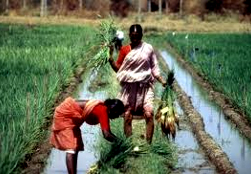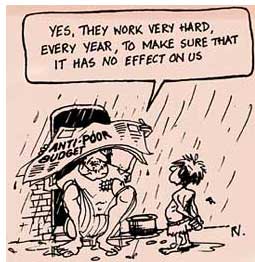Latest News from Down To Earth
Green rider for GDP

After using gross domestic product, or GDP, as the universal measurement of economy for six decades, the world has begun looking beyond this gold standard for measuring a country’s economy.
Grains of doubt

Union Rural Development Minister Jairam Ramesh has rejected the food ministry’s suggestion that 25 per cent of wages under the rural employment guarantee programme be paid in foodgrains. Food minister K V Thomas had written to Ramesh early April, suggesting that part of the wages under the Mahatma Gandhi National Rural Employment Guarantee Scheme (MGNREGS) be paid in kind.
Government Policies and Action Plans
Report of the committee for revision of MGNREGA operational guidelines

The report was prepared by Dr. Mihir Shah, Member, Planning Commission to examine ways in which the Operational Guidelines of MGNREGA could be revised.
Roadmap for the Panchayati Raj (2011-16): an all India perspective

This document discusses the status of Panchayats and approach to roadmap, strengthening democratic functioning of the Panchayats, functions of the Panchayats, functionaries of the Panchayats, Panchayat finances and accounting, e-Panchayat, Panchayat (Extension to Scheduled areas) Act, decentralized governance in the north east states, legal framework & the road ahead.
NREGA and Other Anti-Poverty Programmes
Community and Natural Resource Management
Rural Development
Gender and Poverty
Books
Status of NREGA in Chattisgarh: Key issues & hard options

Report on 'NREGA Tribunal' held in Raipur, Chattisgarh on 7th November, 2006. The Tribunal deliberated that NREGA, though a path-breaking programme, has failed to break off the ground, impacting the life of people very minimally.
Poverty & water

A global spread of case studies is used to illustrate that water is not simply an issue of physical scarcity, but rather a complex and politically driven issue with profound future implications, both in the developing world and outside it. The book argues that for the international community to achieve the Millennium Development Goals, governments must step in to protect the rights of the poor.

















